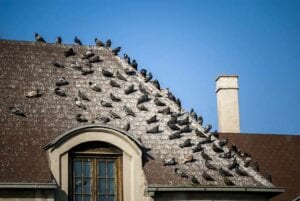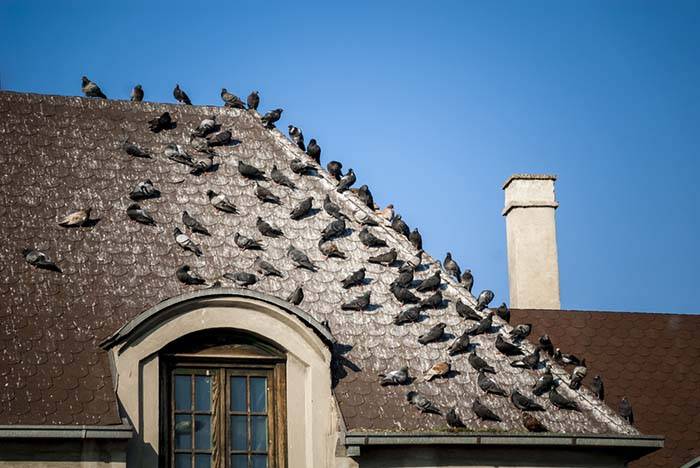Pigeons are not pets! Feral pigeon nuisance is becoming a major problem in North America. They are not afraid of people and roost in almost any area where there is a food source. Where they eat, they leave droppings and the feral pigeons in the city and rural areas are associated with a variety of allergens, bacteria, and other health hazards.
Feeding Pigeons Destroys the Ecosystem
Many people enjoy feeding and watching feral birds, but they are unaware that they may be causing more harm than good. Feeding pigeons creates unnaturally large pigeon populations, and overcrowding can cause disease outbreaks in humans and other wild birds. Keeping a food source around your home for feral pigeons should be discouraged. Pigeons are scavengers and providing them with scraps can result in a nutritional deficiency, and they lose their natural ability to travel elsewhere to find food.
Nothing but Pigeon Poop
A typical pigeon dispenses about 25 pounds of fecal matter per year. Pigeon-related damage costs cities and homeowners for pest control and sanitation, but an even more dire reminder why you shouldn’t feed them are the diseases that can be spread from the droppings. Even with the spikes, nets, and barriers, pigeon-proofing has become a major undertaking. Feral pigeons lay eggs six times a year, and breed more rapidly when near a major food source. In some cities, feeding pigeons is illegal. If you have ever had to clean up after pigeons, you would realize if you don’t feed them they will leave and find their own food source!
Breaking the Habit
Pigeon-lovers are being blamed for the continuous list of complaints about pigeon infestation in major cities across Canada. Even tourists love feeding the pigeons, but they are ruining the building facades and monuments and continue to escalate sanitation costs. Power washing the aluminum or brick on your home is also costly. Pigeons are intelligent and will remember if they are fed. They will return and roost and find a place to nest. Eventually, you will be left with the droppings, and if an infestation occurs, it could get costly.
Dealing with an Overpopulation
If you inadvertently have fed the pigeons and you notice that you have a problem, call a pest control agent to assess the severity of the flock. Before they become a health hazard, or breed, or attract more feral pigeons, DO NOT FEED THEM! If you have bird feeders in your yard, be careful not to drop seed on the ground as this will also attract feral pigeons.
Pigeon Patrol Products & Services is the leading manufacturer and distributor of bird deterrent (control) products in Canada. Pigeon Patrol products have solved pest bird problems in industrial, commercial, and residential settings since 2000, by using safe and humane bird deterrents with only bird and animal friendly solutions. At Pigeon Patrol, we manufacture and offer a variety of bird deterrents, ranging from Ultra-flex Bird Spikes with UV protection, Bird Netting, 4-S Bird Gel and the best Ultrasonic and audible sound devices on the market today.
Voted Best Canadian wholesaler for Bird Deterrent products ten years in a row.
Contact us at 1- 877– 4– NO-BIRD, (604) 585-9279 or visit our website at www.pigeonpatrol.ca
Pigeon/Pigeon Patrol / Pigeons Roosting / Vancouver Pigeon Control /Bird Spikes / Bird Control / Bird Deterrent / Pigeon Deterrent? Surrey Pigeon Control / Pest /Seagull deterrent / Vancouver Pigeon Blog / Birds Inside Home / Pigeons in the cities / Ice Pigeons/ What to do about pigeons/ sparrows , Damage by Sparrows, How To Keep Raccoons Away, Why Are Raccoons Considered Pests/ De-fence / Pigeon Nesting/ Bird Droppings / Pigeon Dropping/ woodpecker control/ Professional Bird Control Company/ Keep The Birds Away/ Birds/rats/ seagull/pigeon/woodpecker/ dove/sparrow/pidgeon control/pidgeon problem/ pidgeon control/flying rats/ pigeon Problems/ bird netting/bird gel/bird spray/bird nails/ bird guard

